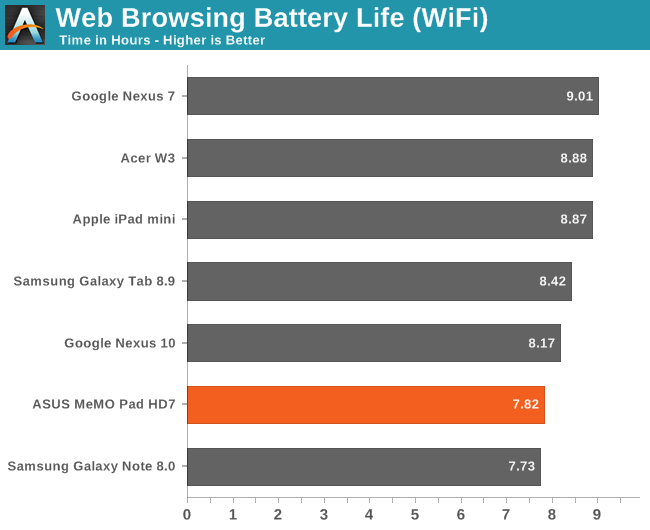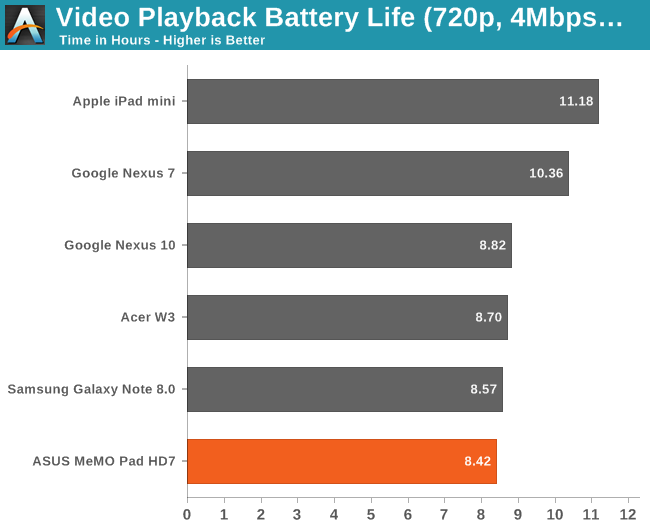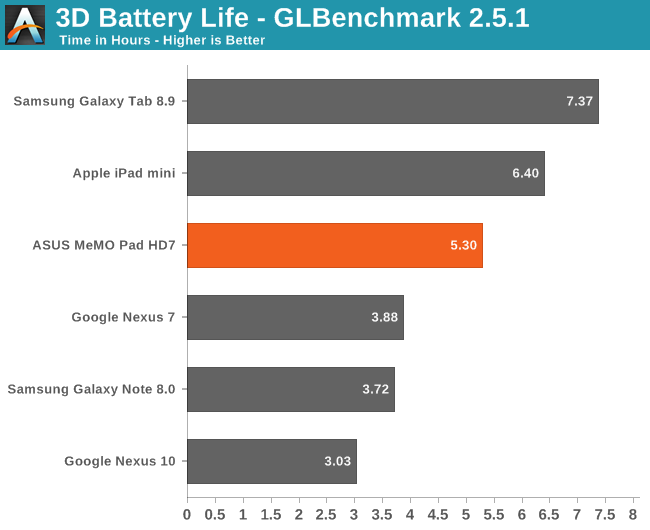ASUS MeMO Pad HD7 Review: $149 Nexus 7.1 Successor & Our First Look at MediaTek's MT8125
by Anand Lal Shimpi on July 29, 2013 3:55 PM EST- Posted in
- Tablets
- Asus
- Mobile
- Android 4.2
- MeMO Pad
Battery Life
The MeMO Pad HD7 includes a 15Wh battery, a ~6% reduction compared to what was in the Nexus 7. The MT8125 SoC on the other hand is likely built on GF's 28nm process, potentially giving it a process advantage over NVIDIA's Tegra 3. There's much more to the platform power consumption story however. Differences in CPU architectures, efficiency of implementation and the surrounding non-CPU IP blocks all play a role in how efficient the MediaTek SoC is.

Normalizing for differences in battery capacity, the MeMO Pad HD7 lasts about 10% less on a single charge than the Nexus 7. Despite being on a lower power process, the MT8125 doesn't seem to be any more power efficient than NVIDIA's Tegra 3. I'm not sure how much of this is a Cortex A7 vs. Cortex A9 thing, and how much of it is the MT8125 just being optimized for cost and not power consumption.

The video playback results are also appreciably lower than the original Nexus 7. I couldn't find any documentation or indication of what video decode IP MediaTek used in the MT8125 but I did notice relatively high CPU utilization during video decode. In the same scenes where Tegra 3's Cortex A9s were running at low utilization/frequencies, I saw 20 - 50% and 1.2GHz on one of the MT8125's A7s.

The one area where the MeMO Pad HD7 ends up more power efficient than the Tegra 3 based Nexus 7 is in our 3D battery life test. Both platforms run Egypt HD at similar performance levels (the T30L Nexus 7 is 15% faster on average), but the MT8125 based MeMO Pad HD7 lasts almost 40% longer. If you normalize for battery capacity, the advantage is even greater. GLB's 3D battery life test has the highest power draw of anything else we run, pointing to idle power optimizations as the biggest problem with the MT8125. What we're seeing here could also be a testament to Imagination Tech's power efficiency advantage over the Tegra 3 GPU.











75 Comments
View All Comments
aryonoco - Monday, July 29, 2013 - link
Seconded. Anand, please get your hands on a cheap Chinese tablet with a Rockchip or Allwinner SoC, if only to test their SoC as well... I'm very intrigued with the RK3188, and Rockchip seems to be ARM's launch partner on Cortex A12, so it's good to keep an eye on them.hip2bsqre - Monday, July 29, 2013 - link
How would you enable/turn on the GPS??hrrmph - Monday, July 29, 2013 - link
On the Nexus 7 Gen 1 its in Settings... Personal... Location Access... GPS Satellites.Checking the box allows applications (maps, navigation, etc.) to get your location from the GPS radio receiver.
HideOut - Tuesday, July 30, 2013 - link
I thought it didnt have the gps fully implemented. Can someone clarify? This would be important to me. Tether off of my S4 and use it as a huge GPS screen while I drive.comomolo - Tuesday, July 30, 2013 - link
According to ASUS, this tablet does have GPS support: https://www.asus.com/Tablets_Mobile/ASUS_MeMO_Pad_...luki442 - Tuesday, July 30, 2013 - link
Memo pad hd 7 support GPS. I have this tablet and confirmZibi - Tuesday, July 30, 2013 - link
Mine had it enabled by default. It works OK with Mapamap apphel556 - Tuesday, July 30, 2013 - link
Memo pad hd 7 have GPS and it works very well.scott.st - Monday, July 29, 2013 - link
It would be nice to do a comparison to the hisense sero pro. This is the same price and of very similar specs. I'm thinking the hisense will edge it out but it would be an interesting comparison.Hubb1e - Monday, July 29, 2013 - link
These things are getting cheap enough and powerful enough for me to post one up at every toilet in my house. Oh yeah!